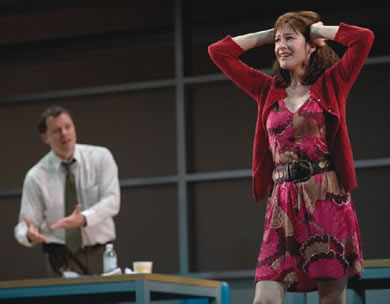'Blackbird' - Learning to Fly
(c) The Examiner
May 4, 2007
By Janos Gereben
The Olivier Award-winner from London, via a successful Broadway run, blew into American Conservatory in Loretta Greco's direction, with Steven Culp and Jessi Campbell grabbing attention from the first puzzling sentence fragments: "Shock." "Of course. "Yes." "Now." For the first seven minutes, which feels a lot longer, we see two people in an obviously strange and difficult encounter (in a harshly lit, large, messy coffee room), without a clue about what's going on. Even so, in this deliberately out-of-context, "Waiting for Godot"-like situation, Culp (a TV and film star since his long-ago ACT days in "Angels in America") and Campbell (a New York actress making her debut here) instantly establish characters that command attention and curiosity. Who are Una and Peter (or is he Ray?), what is their relationship, what has happened between them, why, and what is happening at this tense reunion — chances are you would appreciate the play even if you knew all that, but there is so much more to the experience in the theater if you are in the moment, in real time, with the characters. So, no synopsis here, only a recommendation to see the play, and a warning that it's an "adult" drama. Vladimir Nabokov's "Lolita" and Paula Vogel's "How I Learned to Drive" are often mentioned in connection with "Blackbird," but Harrower's work stands on its own, without the need for precedent. The title, although there is no direct reference to this in the play, may come from the Lennon-McCartney song, which includes the lines "Blackbird singing in the dead of night / Take these broken wings and learn to fly." In a recent interview, Harrower spoke cogently about the play's essence: "It's about the narratives we live by. ... Desire is not this black-and-white thing." The 40-year-old Glasgow playwright, known until recently mostly for his adaptations and translations, has a remarkable ability to guide his characters through sudden, at times shocking, changes in behavior, switching from repulsive to near-understandable states of mind — and yet, almost never does this appear hokey. In hindsight, "Blackbird" has an excessively full, too-varied story, with dazzling ups and downs, such condensed action going counter to psychological plausibility. And yet, while you're watching the play, it's a great show. Less might have been more, but not if the audience was asked to vote on it. And in the end, through Harrower's sparse, austere, "real-life" language, Culp's and Campbell's selflessly open, brave acting, "Blackbird" provides a first-class, rich experience in the theater. Blackbird Where: American Conservatory Theater, 415 Geary St., San Francisco When: 8 p.m. most Tuesdays through Saturdays; 2 p.m. most Wednesdays, Saturdays and Sundays; closes May 27 Tickets: $17.50 to $73.50 Contact: (415) 749-2228 or act-sf.org |
DISCLAIMER: This site is a Steven Culp fan site and is not affiliated with Steven Culp, his family or any of his representatives.
Unless otherwise noted, all captures were made by me from videos from various sources. All shows and photos belong to their respective owners.
NO COPYRIGHT INFRINGEMENT INTENDED!
© 2004-2022 SConTV.com and Steven-Culp.com
Unless otherwise noted, all captures were made by me from videos from various sources. All shows and photos belong to their respective owners.
NO COPYRIGHT INFRINGEMENT INTENDED!
© 2004-2022 SConTV.com and Steven-Culp.com
